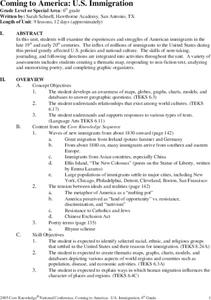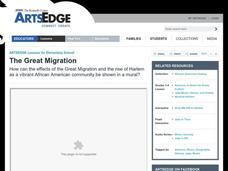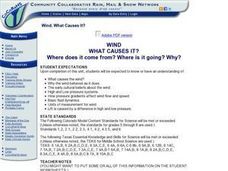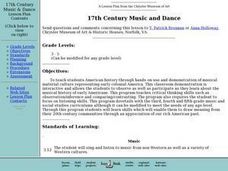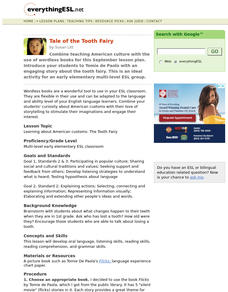Curated OER
Coming to America: U.S. Immigration
Students study immigration in the late 19th and early 20th century. In this immigration lesson plan, students participate in activities including creating maps, responding to non fiction text, memorizing and analyzing poetry, and...
Curated OER
The Great Migration
Students explore how migration to Harlem created a new life for African Americans. In this cross curricular lesson, students illustrate maps showing the migration, paint murals representing African American life in the South and create a...
Curated OER
Meso-America
Students will identify and locate Central and South America and their countries and features, as well as Meso-American civilizations. Students will compare civilizations and discuss voyages of relevant explorers.
Curated OER
Oklahoma Stone Soup
Class members complete activities related to the story "Oklahoma Stone Soup." First, pupils read, discuss, and answer questions about the story. Next, to incorporate math into the lesson, learners make stone soup using a variety of...
Curated OER
Wind, What Causes It?
Students explore what causes wind, why wind behaves as it does, early cultural beliefs about wind, high and low pressure systems, basic fluid dynamics, units of measurement for wind, and how lift is caused; students create and fly kites.
Curated OER
American Indian Art
Fourth graders discover and gain an understanding of American Indian art creating three beads out of clay, showing texture on at least one bead to make a balanced bracelet. They then explain either orally or in writing what kinds of...
Curated OER
Knife River: Early Village Life on the Plains
Students discover the complex culture and trading economy of the Hidatsa and Mandan tribes in North Dakota during the 18th century, as seen by anthropologists and artists.
Curated OER
17th Century Music and Dance
Students explore American history through hands-on use and demonstration of musical material culture representing early colonial America. They compare the music of colonial America to modern music.
Curated OER
Thomas Edison's Inventions in the 1900s and Today: From "New" to You!
Students research types of technology available to Americans at the beginning of the 20th century and compare the style of living to modern times. They identify Thomas Edison's contributions to technology and their own current lifestyles.
Curated OER
Childhood in Early 19th-Century America
Learners interpret and analyze primary source documents and compare and contrast childhood today with that of the past.
Alabama Department of Archives and History
La Mobile: A Case Study of Exploration and Settlement
The Le Moyne brothers, Jean-Baptiste and Pierre, were among the first explorers of the Gulf Coast. Class members read biographical information and journal entries about these men, study maps showing where the settlements they established...
Curated OER
John Lennon’s Imagine and the Vietnam War in the 1970’s
Students analyze the song Imagine. In this Vietnam era lesson, students listen to and analyze the intention and meaning of Lennon's song "Imagine." They discuss what they think Lennon meant and how the song interplays with their own...
Curated OER
African Americans in the Columbia River Basin
Students research the Columbia River Basin Ethnic History Archive (CRBEHA) and use a variety of primary sources to explore the history of blacks in the region.
Alabama Department of Archives and History
Alabama Slave Codes in 1833: What They Can Teach Us About Slaves Themselves
After viewing a short PowerPoint about Nat Turner's rebellion, class groups examine Alabama's 1833 slave codes. Individuals then develop a mini-legal brief arguing against one particular slave law.
Curated OER
"Families and Schools of the Past"
First graders listen to and discuss historical fiction and bigraphies from the early American time period. They role-play, draw, write stories and dress up to re-create events from these historical characters.
Curated OER
A Cultural Study of Arkansas and Saline County for Eleventh Grade Non-College American Literature
Eleventh graders divide into research groups and select a topic to pursue from a list that ranged from historical sites to local ghost stories to the nearby aluminum plant.
Curated OER
Early American Immigration and Race
Young scholars examine and define the different types of immigration. Using different documents, they identify types of migration. In groups, they compare and contrast the migration experiences of the Africans and the British. They...
Library of Virginia
Antebellum Freedom
From indentured servitude to involuntary race-based servitude, slavery has taken many forms in American history. Class members examine three manumission petitions that reveal how the rights of African Americans and African American...
K12 Reader
Bartering for Basics
A passage about bartering practiced by early Native American tribes provides the text for a reading comprehension worksheet that asks kids to use information from the article to answer a series of comprehension questions.
Curated OER
In My Dream
Students listen to recordings of early jazz and identify examples of ostinato and syncopation. They discuss important personalities from jazz cultures and take a quiz on aspects of jazz.
Curated OER
The Tet Offensive and the Vietnam War
Students comprehend how the United States became involved in what one historian called the quagmire. Students identify and analyze the importance of the Tet Offensive in turning American public opinion against the Vietnam War. Students...
Curated OER
Breaking News! Hopi-Spanish Relations
Students explore early contact between the Hopi and Spaniards. In this social studies lesson, students research the establishment of Spanish missions on Hopi lands and the influences of the Spanish on Hopi culture. Students write a news...
Curated OER
Tale of the Tooth Fairy
Students share social and cultural traditions and values. They develop listening strategies to explain what is heard.
Curated OER
social studies: Life in Colonial America
Students explore the trials and tribulations early colonial life and note its successes. Through literature, Internet research, and interactive software, they engage in various activities to evaluate early social and cultural development.


